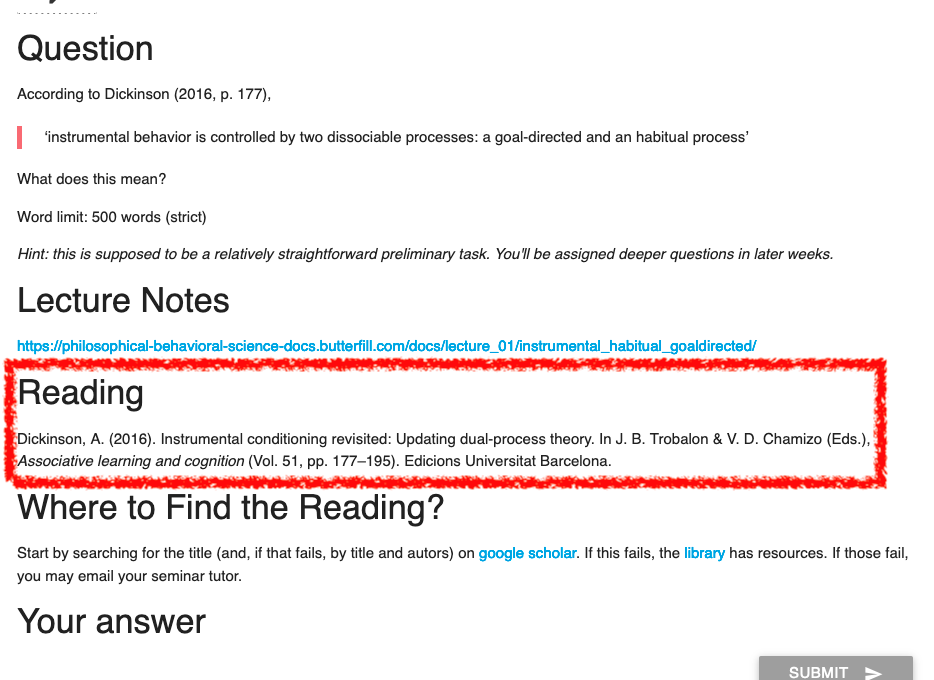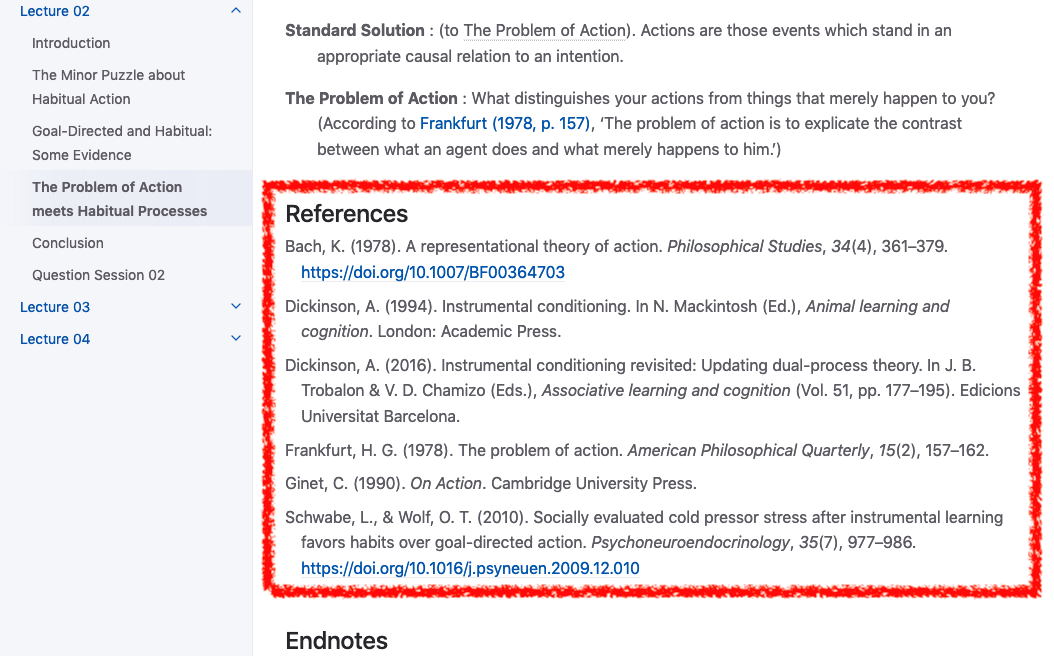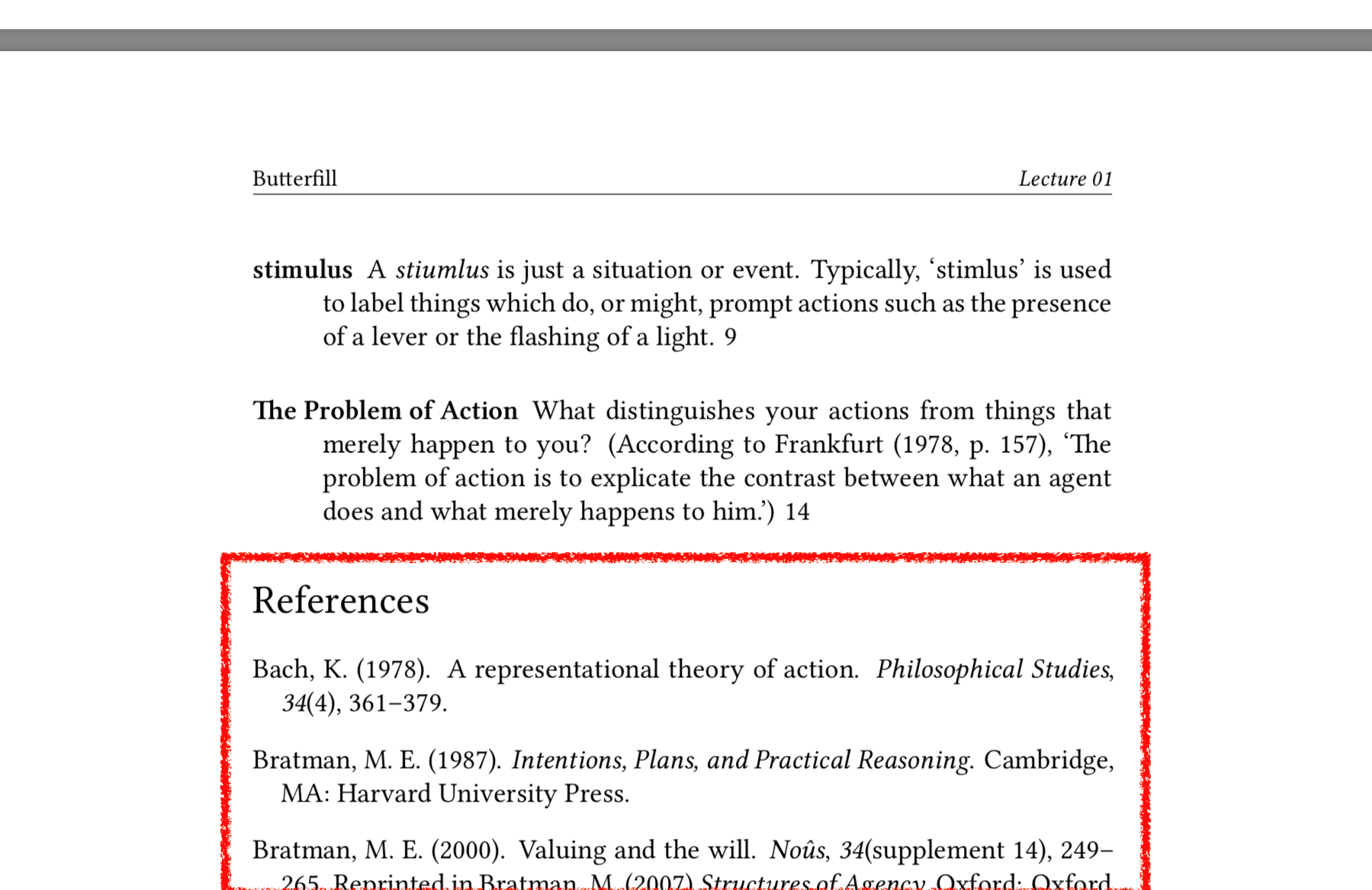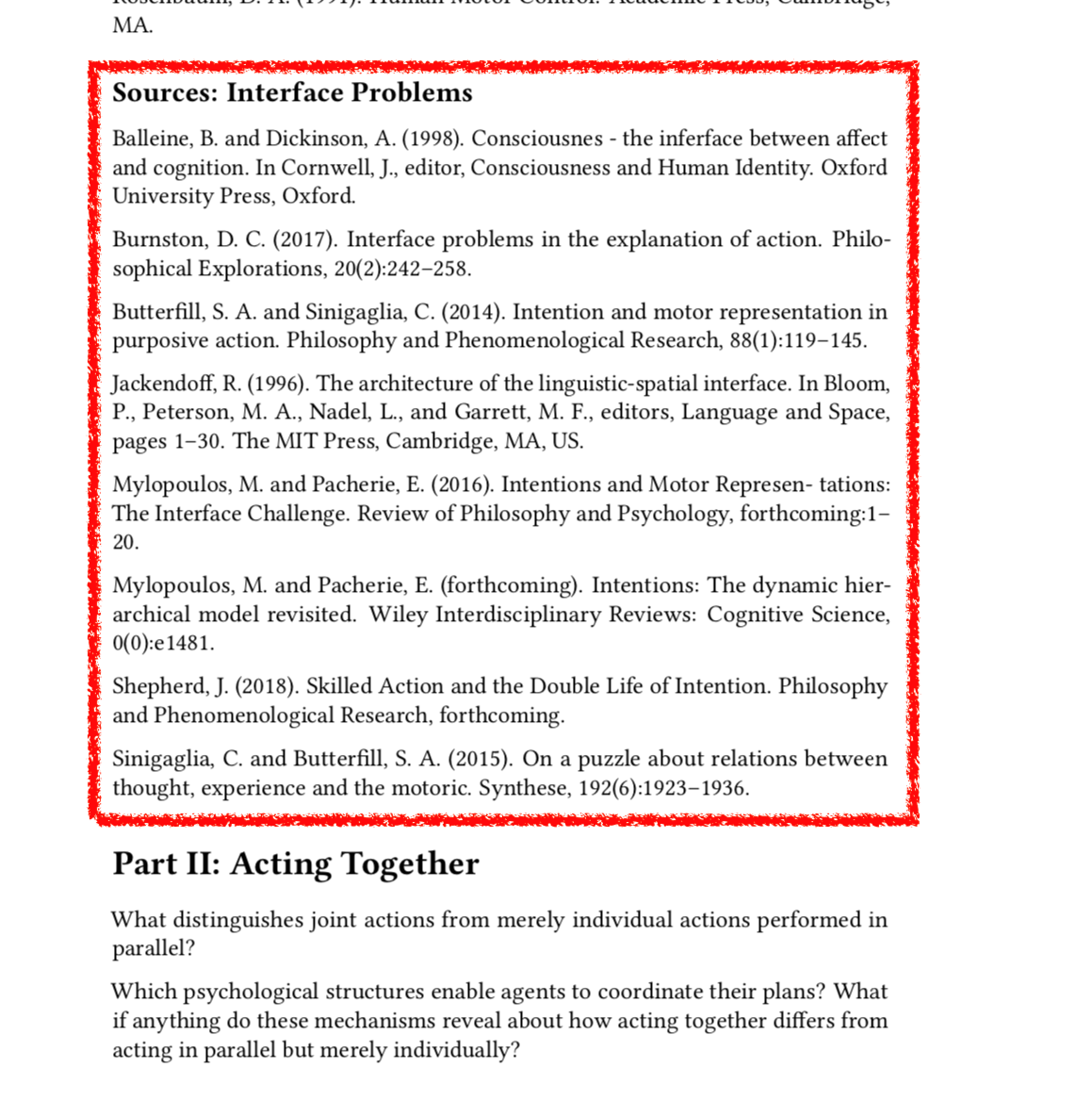Click here and press the right key for the next slide.
(This may not work on mobile or ipad. You can try using chrome or firefox, but even that may fail. Sorry.)
also ...
Press the left key to go backwards (or swipe right)
Press n to toggle whether notes are shown (or add '?notes' to the url before the #)
Press m or double tap to slide thumbnails (menu)
Press ? at any time to show the keyboard shortcuts
Question Session 01

philosophy is done by asking questions
Abiopa
Do habitual processes not still occur with the desire/intention of bringing about the same outcome as in the past?


outcomes:
press red -> electric shock -> pain experience
press green -> chocolate flake -> pleasure experience
stimulus--action associations:
buttons -> press red [becomes weaker]
buttons -> press green [becomes stronger]
During instrumental learning,
preferences can influence which experiences are pleasure and which pain,
and so which stimulus--action links are strengthened and weakened.
While acting,
habitual processes are entirely unaffected by your preferences.
habitual process
Action occurs in the presence of Stimulus.
Agent is rewarded [/punished]
Stimulus-Action Link is strengthened [/weakened] due to reward [/punishment]
Given Stimulus, will Action occur? It depends on the strength of the Stimulus-Action Link.
‘goal-directed’ process
Action leads to Outcome.
Belief in Action-Outcome link is strengthened.
Agent has a Desire for the Outcome
Will Action occur? It depends on the Belief in the Action-Outcome Link and Agent’s Desire.
no
Abiopa
Do habitual processes not still occur with the desire/intention of bringing about the same outcome as in the past?
but ...
Desiring to repeat the high from a daily exercise routine,
and using what she knows from studying animal learning,
Ayesha sets a novel and unique alarm sound,
exercises immediately on hearing this alarm,
and treats herself immediately after exercising.
no
sort
of
Abiopa
Do habitual processes not still occur with the desire/intention of bringing about the same outcome as in the past?
Tiago - background
‘an action is goal-directed if it is mediated by the interaction of a representation of the causal relationship between the action and outcome and a representation of the current incentive value, or utility, of the outcome in a way that rationalizes the action as instrumental for attaining the goal’ Dickinson (2016, p. 177).
Tiago
How should we understand the term 'representation'?
Is it a theoretical term with a specific definition we should know,
or should we not think too much about it?
If I understand correctly, we could explain what 'representation of the causal relationship between action and outcome' means by saying, "The causal relationship between action and outcome is represented by our belief that action X will entail outcome Y."
and something similar for representations of outcome utility (but referring to a desire)
but understanding what 'representation' means becomes trickier if we consider, for instance, the idea of motor representations. Thank you!
step back: what do we need to characterise a representation?




Tiago represents the causal relationship between pressing the red button and getting an electric shock.
has a belief,
knows,
supposes,
guesses,
...
Tiago
How should we understand the term 'representation'?
Is it a theoretical term with a specific definition we should know,
or should we not think too much about it?
If I understand correctly, we could explain what 'representation of the causal relationship between action and outcome' means by saying, "The causal relationship between action and outcome is represented by our belief that action X will entail outcome Y."
and something similar for representations of outcome utility (but referring to a desire)
but understanding what 'representation' means becomes trickier if we consider, for instance, the idea of motor representations. Thank you!

Motor represention is distinct from intention, belief, desire and the rest.
Thf, we have to specify the attitude (by giving its functional role).
Tiago
How should we understand the term 'representation'?
Is it a theoretical term with a specific definition we should know,
or should we not think too much about it?
If I understand correctly, we could explain what 'representation of the causal relationship between action and outcome' means by saying, "The causal relationship between action and outcome is represented by our belief that action X will entail outcome Y."
and something similar for representations of outcome utility (but referring to a desire)
but understanding what 'representation' means becomes trickier if we consider, for instance, the idea of motor representations. Thank you!
‘As a first pass, representations are
‘‘mediating states of an intelligent system that carry information’’
(Markman and Dietrich 2001, p. 471).
They have two important features:
(1) they are physically realized, and so have causal powers;
(2) they are intentional, in other words, they have meaning or representational content.’
(Egan, 2014, p. 116)
‘There is significant controversy about what can legitimately count as a representation.’
(Egan, 2014, p. 117)
But why does Dickinson (and most scientists) talk about representation instead of sticking to belief, desire and the rest?
inferrential integration
a further problem





Functions of Ben’s model of minds and actions:
- ethical
- legal
- normative
- predictiveSecond, consider Ben’s concern with making predictions.
--- speed vs accuracy
Whenever you are making predictions about anything at all, you face a **trade-off between accuracy and speed**. Making more accurate predictions requires considering more information and integrating it in a more complex model of minds and actions. By contrast, making faster predictions requires narrowing the information you consider and using a less complex model of minds and actions. Since Ben often has to make predictions fast enough to actually coordinate his actions with Ayesha’s, and since making predictions consumes scarce cognitive resources, Ben is usually needs to trade accuracy for speed.So Ben’s model of minds and actions is not built for accuracy.
two problems
If we rely on beliefs and desires as paradigm cases of representation, ...
... we may thereby be rejecting some widely accepted claims about what representations are; and
... we may be relying on an unspecified notion that is not optimal for explanation.
habitual process
Action occurs in the presence of Stimulus.
Agent is rewarded [/punished]
Stimulus-Action Link is strengthened [/weakened] due to reward [/punishment]
Given Stimulus, will Action occur? It depends on the strength of the Stimulus-Action Link.
‘goal-directed’ process
Action leads to Outcome.
Belief in Action-Outcome link is strengthened.
Agent has a Desire for the Outcome
Will Action occur? It depends on the Belief in the Action-Outcome Link and Agent’s Desire.
Tiago
How should we understand the term 'representation'?
Is it a theoretical term with a specific definition we should know,
or should we not think too much about it?
If I understand correctly, we could explain what 'representation of the causal relationship between action and outcome' means by saying, "The causal relationship between action and outcome is represented by our belief that action X will entail outcome Y."
and something similar for representations of outcome utility (but referring to a desire)
but understanding what 'representation' means becomes trickier if we consider, for instance, the idea of motor representations. Thank you!
Jan
will there be a reading list for this module?

Jan
will there be a reading list for this module?

Jan
will there be a reading list for this module?

Jan
will there be a reading list for this module?

Jan
will there be a reading list for this module?
nt;wtp list
- readings for in-term assessment (see yyrama)
- readings for your chosen long essay question (see ‘possible titles for your longer essay [pdf]’)
most people list
- decide how much time you will spend each week
- acquire and read those references you find most interesting
- optionally find other sources (and share them with me, thank you)
barty
How are we to understand the 'you' in
It strikes me that either:
A) 'you' refers to your mind/consciousness
or
B) 'you' refers to your body as a complete functioning system
I am sympathetic to B - But does this not mean that there are some actions that we perform that do not require conscious intention?
The regulation of blood flow and fighting off of viruses are not things that merely happen to us, they are things we do.
Can we understand intention as the desired outcome of 'you' by B? Or must intention be understood only consciously (making intention as the mark of action & B incompatible)?
more questions?
